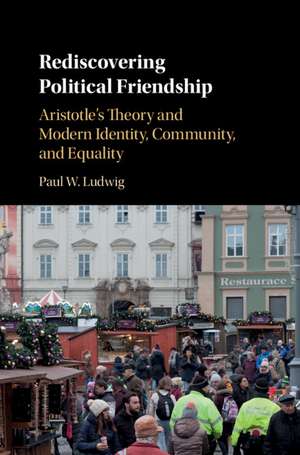Rediscovering Political Friendship: Aristotle's Theory and Modern Identity, Community, and Equality
Autor Paul W. Ludwigen Limba Engleză Hardback – 8 ian 2020
Preț: 755.87 lei
Preț vechi: 878.92 lei
-14% Nou
Puncte Express: 1134
Preț estimativ în valută:
144.68€ • 157.21$ • 121.61£
144.68€ • 157.21$ • 121.61£
Carte tipărită la comandă
Livrare economică 21 aprilie-05 mai
Preluare comenzi: 021 569.72.76
Specificații
ISBN-13: 9781107022966
ISBN-10: 1107022967
Pagini: 362
Dimensiuni: 157 x 236 x 24 mm
Greutate: 0.64 kg
Editura: Cambridge University Press
Colecția Cambridge University Press
Locul publicării:New York, United States
ISBN-10: 1107022967
Pagini: 362
Dimensiuni: 157 x 236 x 24 mm
Greutate: 0.64 kg
Editura: Cambridge University Press
Colecția Cambridge University Press
Locul publicării:New York, United States
Cuprins
Preface and acknowledgments; Introduction; Part I. Foundations of Friendship: 1. Friendship from identity: recognizing anger in the politics of recognition; 2. Friendships from utility and activity: toward a more realistic social policy (and more idealistic civil society); Part II. Where is Civic Friendship Today?: 3. How associations replaced civic friendships: why altruism conspires with self-interest to produce the 'free rider'; 4. Why associations are really civic friendships: finding the balance between associations and the state; Part III. A Different Way to View Liberalism: 5. From communitarianism to civic friendship: broadening out beyond associations; 6. Commercial society and civic friendship: property and liberty are preconditions of friendship; 7. Mass society and civic friendship: the basic agreement that citizens cherish; Part IV. Conclusion: 8. What is the use of civic friendship: sheltering liberal practices from the effects of liberal theory; List of works cited; Index.
Recenzii
'Paul W. Ludwig's extraordinary study of civic friendship is a call to return to Aristotle the master of fact and subtlety and to Aristotle's early liberal critics. Dissatisfied with liberalism today as to what makes citizens into fellows, Ludwig offers analysis and advice to sharpen and redirect our vague sentiments and beliefs. A book for all to learn from.' Harvey Mansfield, Kenan Professor of Government, Harvard University and Hoover Institution, Stanford University, California
'Nothing could be more important in our contemporary political moment than recovering the insight that civic friendship is a factual condition of healthy societies and developing the wisdom to cultivate it here and now. With deep roots in multiple philosophical traditions, Paul Ludwig's fine book starts to rebuild the foundations of healthy politics and merits close attention.' Danielle S. Allen, Director of the Edmond J. Safra Center for Ethics and James Bryant Conant University Professor, Harvard University, Massachusetts
'In this searching and provocative study, Paul Ludwig develops a novel theory of civic friendship rooted in Aristotle's political philosophy. At the heart of Ludwig's theory lies a challenging and utterly persuasive psychological analysis that links friendship to anger, utility, and identity. Combining historical erudition with philosophical acumen, Ludwig reinvigorates our understanding of healthy communities founded on political equality. Surprising and compelling by turns, Ludwig is a joy to read.' Ryan K. Balot, University of Toronto
'… this is a novel, intelligent, and important book.' M. Blitz, Choice
'Nothing could be more important in our contemporary political moment than recovering the insight that civic friendship is a factual condition of healthy societies and developing the wisdom to cultivate it here and now. With deep roots in multiple philosophical traditions, Paul Ludwig's fine book starts to rebuild the foundations of healthy politics and merits close attention.' Danielle S. Allen, Director of the Edmond J. Safra Center for Ethics and James Bryant Conant University Professor, Harvard University, Massachusetts
'In this searching and provocative study, Paul Ludwig develops a novel theory of civic friendship rooted in Aristotle's political philosophy. At the heart of Ludwig's theory lies a challenging and utterly persuasive psychological analysis that links friendship to anger, utility, and identity. Combining historical erudition with philosophical acumen, Ludwig reinvigorates our understanding of healthy communities founded on political equality. Surprising and compelling by turns, Ludwig is a joy to read.' Ryan K. Balot, University of Toronto
'… this is a novel, intelligent, and important book.' M. Blitz, Choice
Notă biografică
Descriere
Applies Aristotle's argument - that citizenship is like friendship - to the liberal and democratic societies of the present day.
